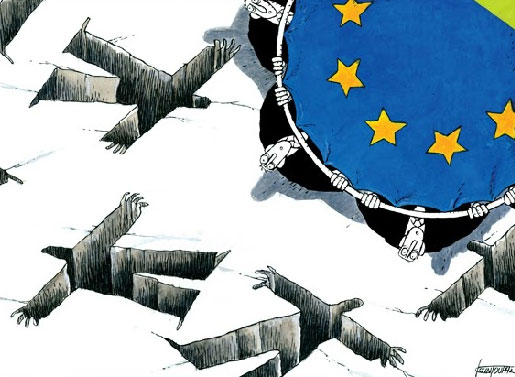Prior to be united, first it is necessary to be demarcated
Until the 20th century, more precisely, until the First World War, we could say that Europe is a united family. Over the centuries, the Europeans were in war, but this war as wittily noted by Spanish philosopher Ortega y Gasset looked like “domestic strife.” The author brings the following example, Charles V was saying about Francis I, “What my brother Charles wants is also what I want’, namely Milan.”
The 19th century prominent figures like Heine, Mendelssohn and Marx were ethnic Jews, but no one would ever think of calling them as representatives of the Jewish culture, and in that sense, Israel had no aspiration for them. They have created in the framework of German and therefore exclusively within the European tradition. In short, Montesquieu made quite appropriate characterization, “Europe is a united nation consisted of numerous nations.” While Balzac was talking about the large continental family, “whose all forces are given to God knows which mystery of civilization.”
But these romantic visions of the 18-19th centuries, today, are considerably stunned. There are three main reasons. 1. The “European non-European” boundary is not so obvious. For example, the Turks from time to time consider themselves Europeans. Ilham Aliyev recently announced that a European-type state is built in Azerbaijan, which, of course, is ridiculous. Our and Georgians “European aspirations” seem quite natural for me, personally, but who knows, perhaps there are Europeans who do not consider these two nations “theirs”. Finally, Russians, whose culture, in my opinion, is 100 percent European, today, as a result of the government’s raised chauvinistic wave, they begin perceiving Europe as a negative, if not to say, a hostile phenomenon. 2. Europe, even if it is a family, but not with equal members, depending on the material circumstances, the Germans, Greeks and, let’s say, the Lithuanian are the native and alien children of the Europe. 3. German citizenship Turks or French citizenship Arabs do not feel them Europeans at all, they’re not going to live by the values of Erasmus or Montesquieu.
There is another important factor. During the 19th century, the European nations have established their ethnic states, it was an “eruption” of passion energy, which died out in the 20th century, and today, perhaps, they need new spiritual incentives to find motivation to develop. But although with delay, the process of formation of ethnic states continues in the 21st century. Russia’s and Ukraine’s “separation” is the vivid example of it. Russians, Ukrainians, Armenians, Jews and others living in Russia are “Russians”, as, for example, Kurghinyan and Mihranyan. Exactly in the same way, the Soviet leaders Chernenko, Kirilenko and Gromyko were Russians. But in this a year and a half, it became clear that a similar problem is raised in Ukraine, and the Ukrainians, Russians and others (except for the residents of Crimea, Donetsk and Lugansk) living in this country feel themselves Ukrainians. Suffice it to say that 40 percent of the Ukrainian army fighting against pro-Russian fighters consists of ethnic Russians.
Today, it would be possible to live in a “European family” when on the one hand, all such “demarcations” will be over, and on the other hand, the traditional values will be modernized. The Armenians who want to live in this family (at this point, we make the minority), need to understand that it is possible in two cases: a. when Russia also professes the European values, b. when our relations with the neighbors are normalized. I think it is clear that these two items are interrelated.
Aram ABRAHAMYAN




















































